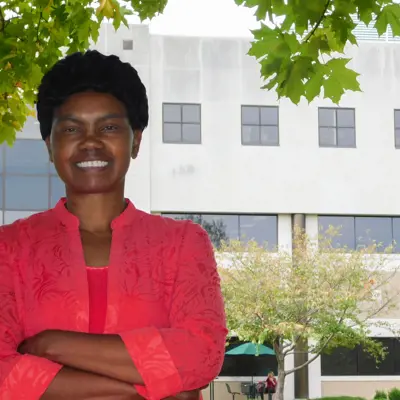In our ongoing Ask the Expert series, we pose practical questions to some of our very own faculty and staff experts. Here at USI, our tagline is "Knowledge for Life." That's a motto that should reach beyond our students to everyone in the USI community. If you have a question you'd like to see answered in our series, you can submit it for consideration.
Dr. Serah Theuri
Associate Professor of Nutrition
Here's what she had to say:
What is metabolism?
- Most people think it's just the rate at which you burn calories but it's more complex than that. It's the rate at which you actually convert your food to the energy that you need in order to support all the biochemical processes that are taking place in your body as you circulate the blood, maintain body temperature, digest food, use your muscles in physical activity and many other processes.
Does metabolism change with age?
- As we grow older, it's not necessarily the age that's the reason why we decline in our rate of metabolism. It's because of the way life socially changes our time demand. Research shows that metabolic rate and how much energy we convert from food begins to decline in early adulthood at a rate of about three percent for men and two percent for women per decade. Reductions in physical activity and lean muscle mass are the major factors associated with metabolic rate decline. Once life starts throwing a lot of time demands at us as we grow older, we don't have time for physical activity, but we also don't change how we eat.
- We tend to blame everything on aging, yet if you look at the Blue Zones, which are places where people live longer and healthier than anywhere else in the world, we see that their lifestyle is defined by a healthy diet, daily exercise and low stress. They never go to the gym or run a marathon, but getting up to work around the home in tasks that involve physical activity is part of their daily life. Slow metabolism is less about age and more about lifestyle.
Are there things you can do to speed up metabolism?
- Physically stay active - one physical component that helps you maintain your muscle mass is doing weight bearing exercises. It doesn't mean you have to go to a gym and lift weights. Research has shown that even low-impact exercises such as walking and yoga, not only boost your metabolism but strengthens the heart, tones the muscles and reduces heart disease risk. During your work or study breaks, walk up the stairs and when the weather is nice, walk around campus. Physical activity can be any simple activities that work your muscles against gravity.
- Drinking water is another one. Our body is 70 percent water, so think about the disservice we do when we drink beverages loaded with sugar and other ingredients. Caffeinated drinks and highly concentrated drinks cause the kidneys to draw water out of the body tissue in order to give the body a fluid balance.
- Good rest. The more you rest, the easier it is for you to regulate your blood sugar. When you are sleep deprived, you are not able to stay awake and be productive. Your body becomes so sluggish in maintaining the blood glucose levels needed to maintain all the components of metabolism.
What are some of the biggest myths about dieting and metabolism?
Myth 1: That you can't control your metabolism. The truth is, physical activity is the main strategy that active people utilize to maintain lean muscle mass and a high metabolism. You have to make the conscious decision to be physically active, sleep well, eat healthy and drink enough water.
Myth 2: If you eat a lot of chilies or drink green tea, it raises your metabolism. The truth is, there's no magic in any food to speed up your metabolism long term. The lift you get from eating chilies does not move the needle to raise the overall rate of metabolism.
Myth 3: Eating late at night slows your metabolism. It's not about the time you eat, it's about the amount of food you consume and what you're going to do about those calories afterwards. You don't need a lot of calories when you will be sleeping in a few hours. A lot of us go through our day on low fuel and fill up at the end of the day when we really don't need that many calories. Your body ends up converting the extra unused calories into fat for storage.
Myth 4: Skipping meals or eating a very low calorie diet will help you boost your metabolism and lose weight. Actually, it doesn't. Your body doesn't know the difference between your intentions to ration your food intake or when you are facing famine. When your body is exposed to extended periods without food, metabolism slows down to utilize conservatively, the nutrients that have already been stored.
